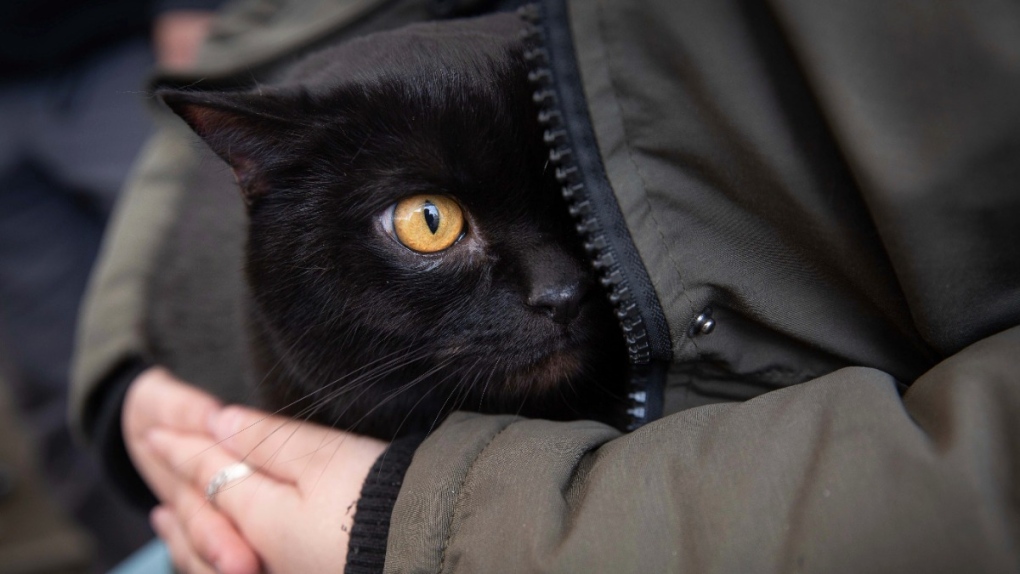Nature Has Made Them Indiscriminate Predators
"[The criteria for including the cat among alien invasive species] are one hundred percent met by the cat.""I have a dog, but I don't have anything against cats [outside of a scientific biological lens]."Wojciech Solarz, biologist, Polish Academy of Sciences
 |
One of seven cats that keep the company of the visitors at a new "Miau Cafe" finishes a cake in Warsaw, Poland, Jan. 13, 2018. \ |
It was a strictly scientific classification of a known predator whose natural hunting endowment is known to be inimical to small mammals and particularly birds. Felines are adept at hunting, and domestic cats for all their domestication, are still feral hunters. Unlike other household animal companions most cats are permitted to exit a house at will, and unobserved can prowl wherever they like, whenever they have a mind to. Their activities are not monitored, but those who have cats in their homes are often gifted by the cat with a freshly caught mouse or a bird.
There is no mystery anywhere in the world about cats' inborn impulse to hunt. Their highly developed skills in seeking out, tracking and capturing prey are second to none others. They do this, relentlessly. There are some people with whom cats live who understand the havoc cats are responsible for in the natural world and as responsible animal lovers keep their cats indoors at all times. Others air their cats using a leash. But most people feel this is unnatural and fails to answer to the cats' need to roam at will.
And as they do, they are an existential threat to other animals. Appeals to cat owners to restrain their cats' activities, explaining the carnage that results by allowing cats to freely roam generally fall on deaf ears. But the reality is that the world becomes a quieter place, devoid of the wide variety of birdsong when species are hunted out of existence.
Humanity's manipulation of the natural environment is also at fault, with the use of pesticides and the seeming inevitability of narrowing bird habitat. Yet the cat's instinctive predation remains responsible for a massive annual kill.
That was all taken into consideration when Dr.Solarz placed cats on a list of "invasive alien species". It's hard to argue for their 'alien' classification, since even in ancient Egypt they were venerated and valued for their distinct qualities as one of nature's gifts to the world. Dr.Solarz's cat classification has raised the ire of his nation's cat lovers, forcing the scientist to defend his decisive classification of cats.
He explained that of the list compiled inclusive of invasive alien species none of the 1,786 animals listed elicited much of a public response, until the 1,787th inclusion, that of cats. He does feel that media reports may have created the impression that his institute might be recommending the euthanizing of feral and other cats to remedy the problem. The intention, however, was to highlight the reality of harm mounted by domestic cat populations on other creatures of the wild.
The Polish Academy institute early in the month published a post on its website responding to the controversy with the intention of clarifying its position, stressing it was "opposed to any cruelty toward animals", arguing its classification synchronized with European Union guidelines. Its alien status from its possible origins in the Middle East to Europe latterly, explains its 'alien' status.
It would be ideal, according to the Institute, if cat owners could be persuaded to limit the amount of freedom they allow their felines in the great out-of-doors, in the interests of preserving other species and most particularly the avian community of animals. It is also often pointed out that cats themselves would be far less prone to accidents, to exposure to harmful chemicals or environmental pathogens, to injury in fights with other cats, and to coming to harm or death in collisions with street traffic.
 |
| Natasha Ukrainec shelters her cat Bonja in Medyka, Poland, after fleeing Kharkiv, Ukraine, on March 8, 2022. (Visar Kryeziu / AP) |
Labels: Bird Annihilation, Classification, Felis Catus, Polish Academy of Sciences

0 Comments:
Post a Comment
<< Home